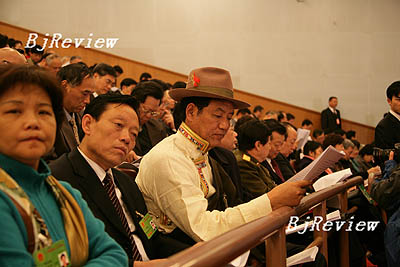|

Chinese Premier Wen Jiabao pledged that the nation's GDP would grow at around 8 percent in 2008 and CPI growth will be kept at around 4.8 percent, when delivering the government work report during the opening meeting of the First Session of the 11th National People's Congress on March 5. Macroeconomic regulations will be improved to maintain fast yet steady economic development, Premier Wen said. Excerpts follow:
It is important to note here that in setting the GDP growth target at around 8 percent for 2008, we have taken into account a variety of domestic and international factors. Our goal is to maintain both steady and fast economic growth, and guide all sectors of society to concentrate on changing the pattern of development, deepening reform and accelerating social development.
The major considerations in setting the target for keeping the CPI this year at around 4.8 percent are as follows: Last year's price increases are still exerting a fairly strong influence and quite a few factors are creating inflationary pressure, making it difficult to bring price increases under control. At the same time, we have to take into consideration the ability of individuals, enterprises and all sectors of society to tolerate price increase and try our best to avoid sharp price increases.
In view of the current domestic and international economic situation we need to follow a prudent fiscal policy and a tight monetary policy this year to accomplish the tasks for macroeconomic regulation.
Continuing to follow a prudent fiscal policy means that we must ensure the continuity and consistency of fiscal policy, get public finance to fully play its important role in promoting structural adjustment and balanced development, and increase expenditures to shore up weak links, improve people's lives and deepen reform. The decision to follow a tight monetary policy was based on the following considerations: the strong possibility of a resurgence in fixed asset investment, continued excessive supplies of money and credit, the still-unsolved problem of excess liquidity, and considerable inflationary pressure. For those reasons, we must improve financial regulation to control the excessively rapid growth in the supplies of money and credit.
First, we will step up efforts to curb excess liquidity by using a combination of open market operations and the required deposit reserve ration. We will make appropriate use of the lever of interest rates. We will improve the renminbi exchange rate regime to make the exchange rate more flexible.
Second, with the focus on improving the credit structure, we will strictly follow requirements for granting loans and guarantee some loans while restricting others. We will limit the increase in long and medium-term loans, particularly to enterprises that are energy intensive or highly polluting and enterprises in industries with excess production capacity. We will make innovations and improvements in bank credit services, improve the systems of guarantees and interest discounts, and increase credit support for agriculture, rural areas, farmers, service industries, small and medium-sized enterprises, independent innovation, energy conservation, environmental protection, and balancing regional development.
Third, we will deepen reform of the foreign exchange administration system. We will improve the system for foreign exchange settlements and sales and payments in foreign exchange, tighten oversight on the flow of capital across borders, and move steadily toward making the renminbi convertible for capital accounts. We will develop new channels and means for using foreign exchange reserves. Comprehensive measures will be adopted to improve the balance of payments.
One major task for macroeconomic regulation this years is to prevent the overall price level from rising rapidly. To fulfill this task, we must take powerful measures to increase effective supply while curbing excessive demand.
First, we must expand production, especially the production of the basic necessities of life such as grain, vegetable oil and meat as well as other commodities in short supply. We must also earnestly implement policies and measures designed to support production and ensure coordination in the production, transport and sale of products.
Second, we must strictly control industrial use of grain and grain exports. The reckless expansion of the capacity for intensive corn processing and construction work on such projects that violate regulations must be stopped.
Third, we need to speed up improvement of the reserve system, improve methods for adjusting reserves and import and export volumes, and appropriately increase imports of major consumer goods that are in short supply on the domestic market.
Fourth, we need to ensure that the timing and size of the government adjustments to prices are appropriate, and necessary adjustment of prices of resource products and public services should also be strictly controlled to prevent waves of price increases.
Fifth, we need to improve the early-warning system to monitor supply and demand and price changes of principal agricultural products and primary products, and put in place a plan for responding to drastic changes in market supply and demand and prices.
Sixth, we must strengthen market and price oversight and pay close attention to the oversight and inspection of prices and charges related to education, medical care, drugs, agricultural supplies, agriculture, rural areas and farmers. Illegal activities such as colluding or hoarding to drive up prices will be punished in accordance with the law.
Seventh, we need to promptly improve and implement measures to aid the low-income sector of the population.
Eighth, we must work to ensure that the prices of the means of production, particularly agricultural supplies, do not rise rapidly.
Ninth, we will continue to implement the system of provincial governors assuming responsibility for the "rice bag" (grain supply) program and city mayors for the "vegetable basket" (non-staple food supply) program. | 